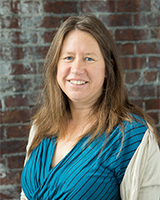 Today we feature an interview with Dr. Jane Compson. Dr. Compson is a professor of comparative religion and ethics at the University of Washington, Tacoma as well as a member of the AI&Faith research team. Her research and teaching focuses on applied ethics and “engaged” religion and includes topics such as environmental and biomedical ethics. Her current research involves applying insights from Buddhist traditions, particularly Buddhist understandings of the mind and its relation to suffering, to contemporary contexts including higher education pedagogy, environmental education, and healthcare. She is a board member of the Altruism in Medicine Institute, whose mission is to increase compassion and resilience among health care professionals and their patients.
Today we feature an interview with Dr. Jane Compson. Dr. Compson is a professor of comparative religion and ethics at the University of Washington, Tacoma as well as a member of the AI&Faith research team. Her research and teaching focuses on applied ethics and “engaged” religion and includes topics such as environmental and biomedical ethics. Her current research involves applying insights from Buddhist traditions, particularly Buddhist understandings of the mind and its relation to suffering, to contemporary contexts including higher education pedagogy, environmental education, and healthcare. She is a board member of the Altruism in Medicine Institute, whose mission is to increase compassion and resilience among health care professionals and their patients.
How would you describe your experience with AI?
Until I was invited to join AI and Faith, I had little experience with AI in terms of my professional background and interests. However, since joining I realize I probably have much more experience with AI than I realize! Like most other people, I am interacting with AI and experiencing the results of its algorithms multiple times a day without knowing it, through my use of apps on the internet for example. My choices and behaviors, the information I see, and so on are, I suspect, increasingly influenced by AI, yet their algorithms are a ‘black box’ to me. It feels important to become more aware of how AI is shaping my experience of the world, and the values that underpin the algorithms.
How would you describe your faith background?
I started out as a pretty liberal Christian in the Church of England. I then became an agnostic, and since young adulthood I’ve found my spiritual home in Buddhist traditions. The agnostic side to me is still very much present, and I have found this to sit more easily with Buddhist narratives and perspectives. I find inspiration, beauty, and wisdom in pretty much every faith tradition I have come across, though! I generally have a reluctance to identify with any one religious ‘ism’.
What led to your interest in the intersection of AI and faith?
Most of my academic work focuses on the application of religious or spiritual teachings (in my case, mainly Buddhist traditions) in contemporary secular contexts. I am interested in the more ‘meta’ questions about how religion and secularism relate, as well as more specific applications (for example, what insights Buddhist traditions might bring to environmental ethics). AI and faith is an area where these questions clearly apply, and it is obviously a very live issue in our contemporary world.
Why are you involved with AI&F?
I am involved because there are some high-stakes ethical questions around AI and I think the more voices at the table (both secular and religious) the better, before the AI genie gets completely out of the bottle. AI algorithms will have a huge impact on our future. It is important that the decisions about their goals, and the values that underpin them, are transparent and can be challenged and negotiated to avoid abuses of power and inequity. Part of this transparency is to have interdisciplinary and diverse perspectives, including from different faith traditions. It is also great to work with so many folks from around the world and from multiple disciplines to learn from their excellent work. Our conversations always leave me feeling enriched and with so much to think about.
How does AI&F affect your work outside the organization?
The kind of issues that come up in our AI&F discussions have relevance in the other areas of applied ethics and religious studies I am working in. Topics such as, who and what is morally considerable, and why? In a pluralistic society, how do we come to any kind of consensus about shared guiding ethics? What are our sources of moral authority, and who gets to decide? What contributions can religious traditions make to questions in a primarily secular world, and to what extent can or should these be persuasive to non-religious people, and why?
What open problems in AI are you most interested in?
There are so many! I have listed some of them above. In addition to the big questions like ‘what is ethical AI, who gets to decide that, and how?’, there are more faith-specific questions. For example, there are multiple interpretations and narratives about what is right and wrong not just across but within faith traditions. How do we adjudicate between them? Why should a non-theist be persuaded by an ethic grounded in a theistic worldview with which they are fundamentally at odds? The list could go on and on – there are a bewildering array of open problems. I do not begin to think that I have any of the answers, but I do think that the more these conversations are inclusive and transparent, the better. Hence my involvement with AI&F for its advocacy in this area.
Acknowledgements
A big thanks to Dr. Jane Compson for her time to carry out this interview. Thanks to Emily Wenger for proofreading, editing, and publishing this work.


